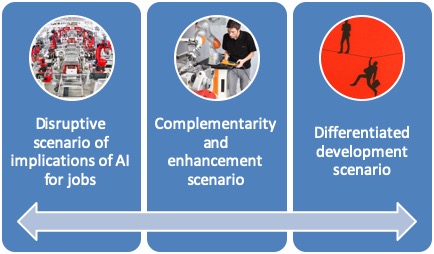1.8 How Will AI Change the World of Work (Introduction)
When talking about the implications of the AI technologies and solutions for the future of work, there can be distinguished several main scenarios:

- Disruptive scenario, claiming, that implementing these technologies reduces job opportunities, especially for the low and middle level skills workers by taking over the routine jobs. However, some authors notice, that AI can be used for the execution of non-routine tasks and the growing technological opportunities will enable AI to become attractive alternative for human workforce even in the high-skilled work.
- Complementarity and enhancement scenario, claiming the application of the AI technologies enable people to perform their work much better by improving quality of performance (AI enabled diagnostics in the healthcare), liberating people from the routine tasks and thus improving the quality of employment and increasing productivity.
- Differentiated development scenario, which claims, that the implications of the AI technologies for the future of work strongly depend on the economic factors, such as the costs of labour. If the comparative costs of labour are lower than the costs of investing in AI technologies, then the risks of replacement of human workers with AI solutions will be low. As far as the labour costs are highly different in the sectors of economy and countries, this scenario would lead to the different pace and extent of digitalization and AI application in the sectors of economy and countries, with the implications for the workforce migration and training.
These video and audio materials provide interesting ideas and insights on the implications of AI for the future of work and employment.
